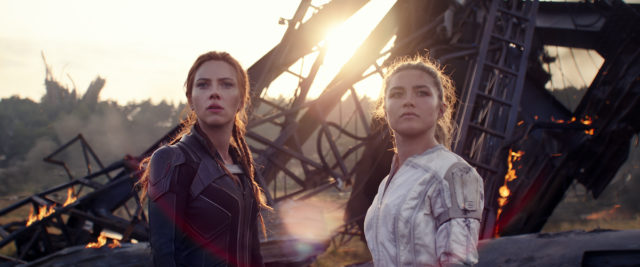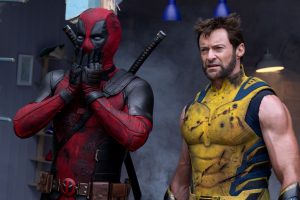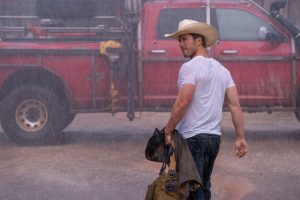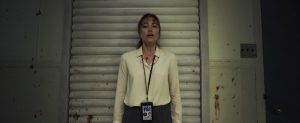Reviews include Deadpool & Wolverine, Doubles, and Mountain Queen: The Summits of Lhakpa Sherpa.
TFCA Friday: Week of July 9
July 9, 2021

Welcome to TFCA Friday, a weekly round-up of film reviews and articles by TFCA members.
In Release this Week
The Adventures of Saul Bellow (dir. Asaf Galay)
“Asaf Galay has constructed a solid profile of a top literary figure, from his birth in Lachine, Quebec through his best days in his beloved Chicago to his death in New England,” writes Marc Glassman at POV Magazine.
Black Widow (dir. Cate Shortland)
“Shortland has given us a fast-paced movie with action sequences, character depth, and very subtle social and political subtexts about the way women are seen, treated and exploited in the world,” raves Karen Gordon at Original Cin.
“[A}n engaging mash-up of chases, close-quarters action and family road movie: imagine Little Miss Sunshine, if all of the characters in the minivan were Jason Bourne,” notes Norm Wilner at NOW Toronto. “It kinda changes the dynamic.”
“At least the performers appear to be having a good time…especially the sly Weisz and lumbering Harbour, whose 75-per-cent effort here feels more like 100 given their surroundings. It’s almost superheroic,” yawns Barry Hertz at The Globe and Mail.
“There are some outrageous stunts in Black Widow of course, but they’re nothing compared to the work that went into crafting craaazy Russian accents for everyone except Johansson, who had the good sense to use her natural voice…from the get-go, 11 years ago,” writes Chris Knight at the National Post.
“No question Australia’s Cate Shortland (Somersault) has what it takes to boss a Marvel movie,” writes Peter Howell at Night Vision. “All the action set pieces and explosions happen on cue and she handles character development better than most MCU directors.”
Bone Cage (dir. Taylor Olson 🇨🇦)
“Director-writer-star Taylor Olson sets himself up with a particular challenge here: how to convince Canadians to watch his delicate, intense portrait of small-town agony knowing that a good portion of Canadians have by this point been conditioned to run away screaming from domestic cinema,” writes Barry Hertz at The Globe and Mail. “But bless Olson for going at it regardless, and coming out the other end with a worthy addition to Atlantic Canada’s increasingly intimidating film scene.”
“I don’t know what’s in the water in Atlantic Canada, but more filmmakers need to drink it up,” says Pat Mullen at That Shelf. “Bone Cage comes together with fearless intensity as the camera closes in tight on Olson’s gutsy performance.”
“Director Olson has created an effective and credible mood and atmosphere for his film,” writes Gilbert Seah at Afro Toronto. “The confines and trappings of small town Canada are well created, with lots of attention to detail.”
Fear Street: Part 2 – 1978 (dir. Leigh Janiak)
At Afro Toronto, Gilbert Seah says the film “never really covers new territory in the horror genre, but rehashes the favourites of the genre.”
“If you’re going to make a movie in which a psycho slices away at both campers and counsellors in direct homage to the age of Jason Voorhees, you need to go scuzzy or go home,” argues Barry Hertz at The Globe and Mail. “A proper slasher movie should make you want to take a shower. Here, I felt sparkling clean.”
Gunda (dir. Viktor Kossakovsk; July 13)
“It’s stunning work, as quiet and powerful as a film gets,” raves Anne Brodie at What She Said. “As I say, it is emotional and will change your day, and maybe your habits.”
How I Became a Superhero (dir. Douglas Attal)
“With humour and action, this French super action hero movie which blends in the cop genre is a welcome addition to the family of international Netflix originals,” writes Gilbert Seah at Afro Toronto.
Last Summer (dir. Ozan Açıktan)
“Totally boring, annoying, pretentious and totally aimless,” groans Gilbert Seah at Afro Toronto.
Lift Like a Girl (dir. Mayye Zayed)
“A wonderful, haunting foray into a different world where striving for success is a lifestyle, no matter how young,” observes Anne Brodie at What She Said.
“The doc is frustrating in that I wanted to hear more from the girls, and less from their noisy coach and promoter,” admits Chris Knight at the National Post. “But Zebiba is so quiet, even a direct question from one of her colleagues elicits little more than a shrug. Sometimes she’ll just give the camera a what-can-you-do? look as Captain Ramadan rages on.”
“Great documentaries are often created through amazing real life characters,” says Marc Glassman at POV Magazine. “Lift Like a Girl has one for the ages, Captain Ramadan, a crude, funny, gravel voiced man, who mixes his foul language with regular calls to the Prophet while inspiring girls to become weightlifters.”
The Loneliest Whale (dir. Joshua Zemen)
“The documentary expertly balances on a fin-thin line between sentimental anthropomorphizing and science,” says Chris Knight at the National Post. “We meet some winsome oddballs, like the guy who plays his saxophone at sea, letting the whales harmonize with his music. And there are marine biologists and oceanographers, though even they are clearly caught up in the soulful side of the story.”
“The team was to get photos and video, skin samples then tag it with a tracker. Drones, sonar detection and flute playing gained the team traction,” writes Anne Brodie at What She Said. “But what they found was utterly unexpected, a shock. I’ll let you find out for yourselves!”
Love Type D (dir. Sasha Collington)
“Endearingly funny and sweet, a positive take on the anti-romcom you could use,” chuckles Anne Brodie at What She Said.
Major Grom: Plague Doctor (dir. Oleg Trofim)
At Afro Toronto, Gilbert Seah calls it a “fresh action hero thriller that covers several popular genres, executed with lots of style and aplomb.”
Marathon (dir. Keith Strausbaugh and Anthony Guidubaldi)
“Anyone who enjoyed Christopher Guest’s films—Best in Show, A Mighty Wind, Waiting for Guffman—will want to see Marathon,” suggests Marc Glassman at Classical FM. “ It’s not as good as Guest’s mock-docs because the actors lack the improvisatory talent of Catherine O’Hara, Eugene Levy, Parker Posey and Fred Willard but the film will keep you amused—and it is fun to laugh at marathons.”
Meander (dir. Mathieu Turi)
“Meander, by director Mathieu Turi, uses the device of the escape room, or tunnel in this instance, as a way of negotiating the story of a woman’s perilous journey through a debilitating sadness,” writes Thom Ernst at Original Cin. “It’s allegorical, no doubt. But it’s an allegory that makes excellent use of an incredibly intricate and claustrophobic set piece.”
“If you’re just looking for creepy visuals and the occasional gruesome effect, Meander does have those things,” says Norm Wilner at NOW Toronto. “Quite a lot of them, actually. There’s probably a great short film in here, but at feature length the parts just don’t add up to a satisfying whole.”
The Misfits (dir. Renny Harlin)
“A standard film of its kind with some amusing lines and situations, straight out of the early 90s, late 80’s,” admits Anne Brodie at What She Said.
“[A] line of dialogue used in the film as verbalized by Brosnan (when his group attempts to convince his character to take part in the heist) could also be used to describe this film: ‘If this was not so amusing, it would be sad!’” laughs Gilbert Seah at Afro Toronto.
Rock, Paper, Scissors (dir. Martín Blousson and Macarena García Lenzi)
“It’s an understandable impulse for a film of this sort to hold off on divulging secrets, content to fill the story with ambiguity rather than rush to reveal anyone’s agenda,” admits Thom Ernst at Original Cin. “But directors Martín Blousson and Macarena García Lenzi’s tight clench on the film’s secrets feels more like an exercise in prying out a reveal than a steady unraveling of clues and discovery.”
Running Against the Wind (dir. Jan Philipp Weyl)
“A cliché-ridden, well intentioned feel-good movie aided by the beauty of Ethiopia displayed on screen,” says Gilbert Seah at Afro Toronto.
Son (dir. Ivan Kavanagh)
At Afro Toronto, Gilbert Seah finds that the film “contains enough chilling elements but it lacks detail in its narrative.”
https://www.youtube.com/watch?v=rYsaptqhWiE
A Sweaty, Pulpy Summer
Craving a big screen and some air conditioning? Barry Hertz and Johanna Schneller join the team at The Globe and Mail to offer some sweaty summer movies to help beat the heat. Their picks? Die Hard with a Vengeance (“the second-best Die Hard”) and Do the Right Thing (“smacks you in the chest and sticks to you”), respectively.
Quentin Tarantino adapts his own film into literature with the novelization of Once Upon a Time…in Hollywood. Barry Hertz cracks Tarantino’s spine at The Globe and Mail, and is surprised to see that, yes, this is another case in which the book is better than the movie. “While subsequent viewings of OUATIH haven’t shaken my feelings toward the film, a brisk read of Tarantino’s backwards-adaptation has melted my icy view of the man’s original intentions,” writes Hertz. “Once Upon a Time in Hollywood: A Novel (the ellipsis is now curiously gone from the title) is far from a literary masterpiece, or even an airport-newsstand all-timer. But it is a meaty and imaginative piece of meta-pulp.”
A Festival of Festivals: From the Croisette to CBC Gem
At POV Magazine, Jason Gorber chats with director Mark Cousins, whose latest entry in The Story of Film series, A New Generation, just premiered at the Cannes Film Festival. Cousins says that combing through the history of cinema hasn’t made him cynical about the moviegoing experience. “I still watch films the way I always did, in the front row of the cinema, with my guard down, without any filters, like a child,” says Cousins. “I watch like the boy that I was when I fell in love with cinema…Being a filmmaker and seeing behind the curtain hasn’t taken away the sense of wonder about filmmaking or about going to the movies because it’s still bigger than life.”
At Original Cin, Liam Lacey surveys the shorts playing at the Future of Film Showcase, which moved too CBC Gem during COVID and offers a wider reach for films by some notable up-and-comers: “Films about racial and gender identity include Azis Zoromba’s Faraway, a slow-burn study of loneliness and alienation, as a young gay Arab man in Montreal tries to contact his ill mother over a four-year period. In Callahan Bracken’s animated three-minute My Head Aches When I Look Too Long, a gay teen-age boy takes a break from internet porn and feels guilty about plucked flowers. Kourtney Jackson’s short documentary, Wash Day, follows three young Black women as they wash their hair and talk about body image and beauty, the contrary meanings of pride as both vanity and self-care.”
TV: Ronan, Lotus, and Wine
At What She Said, Anne Brodie finds an engrossing story in the Crave miniseries Catch and Kill: The Podcast Tapes, which recounts Ronan Farrow’s game-changing New Yorker article on Harvey Weinstein: “Farrow was an investigative journalist on NBC’s Today show but his centrepiece story on Weinstein was rejected when the net received legal and death threats. Umber Gutierrez, an aspiring actor, finally decided to stop HW by agreeing to wear a wire to a meeting with him, as police waited outside. He did what he did and the rest is history .. but what else happened? Farrow’s well-made, thorough doc is a tad self-serving but he is part of the story.” She’s been busy binge-watching with Gossip Girl (“for guilty pleasures, tune in!”), The White Lotus (“ripe for all kinds of fun and suffering and humanity”), This Way Up (“A wild experience”) and The Wine Show (“wit, wisdom and a side of cheese”).
At NOW Toronto, Norm Wilner also checks out Mike White’s The White Lotus and finds something fun, if familiar: “This is White’s version of Big Little Lies or Dead To Me, which means the mystery aspect isn’t as important as his barbed observations of the pampered privileged class and a sympathetic view of the people who spend their days reassuring them that everything is going to be just the way they like it.” I Think You Should Leave, on the other hand, feels like it’s “running out of gas.”



